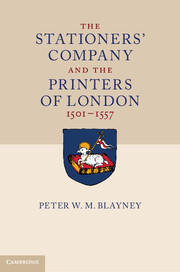Book contents
- Frontmatter
- Dedication
- Contents
- List of illustrations
- Preface
- Acknowledgements
- Permissions
- Conventions
- List of abbreviations
- 1 1357–1500
- 2 1501–1509
- 3 1510–1520
- 4 1521–1528
- 5 1529–1534
- 6 1535–1541
- 7 1535–1541
- 8 1542–1546
- Endnotes to Volume I
- 9 1547–1553
- 10 1553–1557
- 11 1554–1557
- 12 1501–1557
- APPENDIXES
- Bibliography
- Index of STC numbers
- General index
2 - 1501–1509
In the beginning…
Published online by Cambridge University Press: 05 November 2014
- Frontmatter
- Dedication
- Contents
- List of illustrations
- Preface
- Acknowledgements
- Permissions
- Conventions
- List of abbreviations
- 1 1357–1500
- 2 1501–1509
- 3 1510–1520
- 4 1521–1528
- 5 1529–1534
- 6 1535–1541
- 7 1535–1541
- 8 1542–1546
- Endnotes to Volume I
- 9 1547–1553
- 10 1553–1557
- 11 1554–1557
- 12 1501–1557
- APPENDIXES
- Bibliography
- Index of STC numbers
- General index
Summary
De Worde and Pynson in London
The sixteenth century began with the first year in which all books known to have been printed in England were apparently printed in London itself. The men who printed them were not only master printers: they were also importers, publishers, distributors, booksellers, and binders. De Worde had been a denizen for nearly five years. Although Pynson's Norman origins may strictly have qualified him as an indigena he would have found it increasingly difficult to convince people of that technicality, and in 1513 he would acknowledge himself an alien by purchasing letters of denization. But nationality aside, before moving into Fleet Street neither man was a citizen of London. That fact would not have stopped them importing, publishing, or distributing, all of which non-citizens could legally do. And because they had no native rivals, as printers de Worde and Pynson posed no competitive threat to any citizen. But as non-citizens, inside the City limits they could bind books only with the consent of the Stationers’ Company and could not legally retail them at all.
In his will of 1534 de Worde described himself as ‘citizen and staciouner of london’, using the formula reserved for freemen of companies. A City record of December 1521 describes him as one of four ‘Ciues’ and individually as a ‘Stacioner’, so he was presumably already free by then. Pynson, similarly described in a record of October 1520, declined to use the proper formula in his will of 1529, but all three drafts of a contract of 1523–4 call him ‘Cyttezeyn and stacioner’ in one spelling or another. Furthermore, in February 1510 the Court of Aldermen agreed that no denizen should thereafter be made free ‘withoute assent of the maire and aldermen and the Comen Councell’, so it is unlikely that either de Worde or Pynson could have been freed after that date without a record surviving. And in Pynson's case, as early as 28 June 1502 a legal document described him as ‘Ricardum pynson Ciuem & Stacionarium’ of London.
- Type
- Chapter
- Information
- Publisher: Cambridge University PressPrint publication year: 2013



